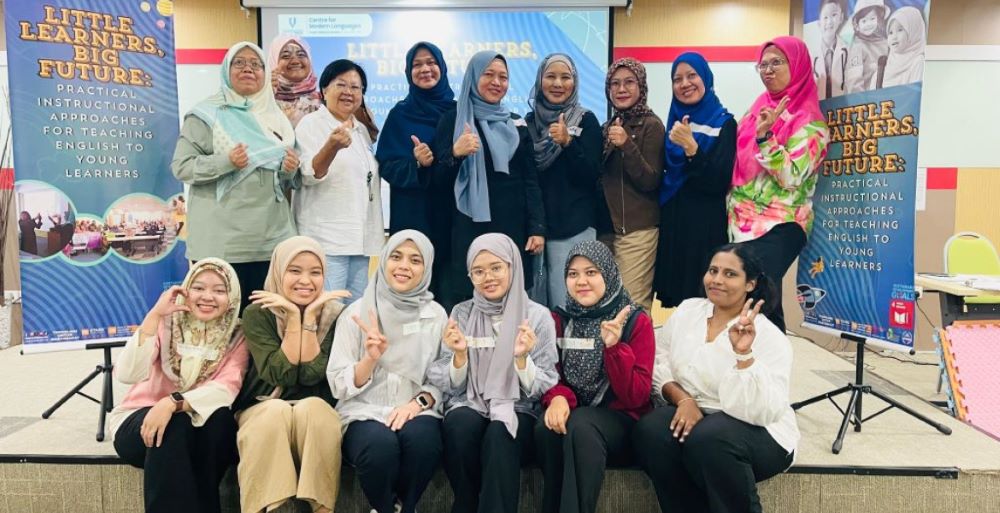UMPSA helps early childhood educators master English
GAMBANG, 28 September 2024 – A total of 47 educators from various nurseries and kindergartens around Kuantan and Temerloh participated in the programme Little Learners, Big Future: Practical Instructional Approaches for Teaching English to Young Learners, organised by the Centre for Modern Languages (CML), Universiti Malaysia Pahang Al-Sultan Abdullah (UMPSA), at UMPSA Gambang Campus recently.
According to CML Lecturer and also the programme director and trainer of the Pahang Association of Early Childhood Educators (PPAKK), Dr. Ezihaslinda Ngah, this programme was funded through the Knowledge Transfer Grant Scheme for Communities channelled via the UMPSA Center For Industry and Community Linkages (ICoN).
“This is also a continuation of the KTP Kindy Knowledge Transfer Programme, initiated by Associate Professor Dr. Noor Raha Mohd Radzuan and Dr. Wan Jumani Fauzi since 2015.
“The programme’s objectives are aligned with UMPSA’s goals to enhance English proficiency within the community and support educational growth in line with Sustainable Development Goal 4 (SDG 4): Quality Education.
“In fact, this programme also supports global efforts to ensure inclusive, equitable, and quality education for all levels of society, thereby contributing to increased access to lifelong learning opportunities,” she stated.
She further added that the main focus of the workshop was to introduce new pedagogical ideas to early childhood educators.
“In addition, the programme emphasised the preparation of teaching materials needed by teachers to stimulate interactive and comprehensive learning.
“This is part of the effort to attract children’s interest in learning English, enhance their English proficiency, and enrich their vocabulary,” she said.
The programme was also supported by several CML lecturers, namely Associate Professor Dr. Noor Raha Mohd Radzuan, Dr. Wan Jumani Fauzi, Alia Najaa Md Nor, Aisyah Khaleeda Rosli, and Noor Azlinda Zainal Abidin, as well as UMPSA postgraduate student Ishafira, who was appointed under the Community Grant Student Work Scheme.
Dr. Ezihaslinda also highlighted that one of the programme’s key features was interactive learning, which emphasised the use of interactive methods to engage children in the learning process.
“This approach is essential to help them understand language concepts more effectively while maintaining their interest and excitement in learning.
“In addition, it highlighted support for educators by providing comprehensive teaching manuals to help teachers integrate English into their daily activities more easily and effectively.
“This programme also reflects the success of collaborations between academia and the community, thereby strengthening the role of educational partnerships in achieving high-impact learning outcomes,” she said.
Meanwhile, according to the PPAKK Deputy Chairperson, Chan Yin Yin, the programme was excellent as it was complete with detailed storytelling materials and trainer guidance in small group discussions.
“Interactive games made learning more enjoyable.
“The training provided also benefited the teachers, and it should be continued to empower more educators,” she said.
The programme’s best participant, Siti Zubaidah Salehudin, expressed that the programme she participated in was very helpful and provided many benefits for kindergarten teachers like her.
“English is very important, especially at the early stages of children’s education, and being able to share experiences with other teachers has made me feel more confident in communicating in English.
“Programmes like this provide added value to educators like me and other participants.
“The organisers and presenters, in particular, have provided excellent and meaningful sharing to the participants,” she said.
She further explained that activities such as the introduction to animals had been translated into games, which undoubtedly would make it easier for children to remember and more enjoyable for them to learn.
One of the participants, the only male participant, Ahmad Nasharudin Al-Bakri, also expressed his happiness and gratitude for the workshop.
“Many exciting innovations were introduced, opening educators’ minds to think creatively and come up with extraordinary ideas.
“I was also impressed by the expertise and leadership of the trainers, who successfully guided us through challenging projects.
“The use of English in learning is highly effective, and the direction and support from the organisers clearly help us educators stay on the right track,” he said.
The programme ended with positive feedback from the participants, most of whom were confident in using new techniques in the classroom to further enhance children’s engagement in learning English.
It is hoped that the programme will continue to be implemented, benefiting a larger group in the future.
By: Noor Azlinda Zainal Abidin, Dr. Ezihaslinda Ngah, Associate Professor Dr. Noor Raha Mohd Radzuan and Dr. Wan Jumani Fauzi, Centre for Modern Languages
Translation by: Dr. Rozaimi Abu Samah, Faculty of Chemical and Process Engineering Technology
- 45 views










